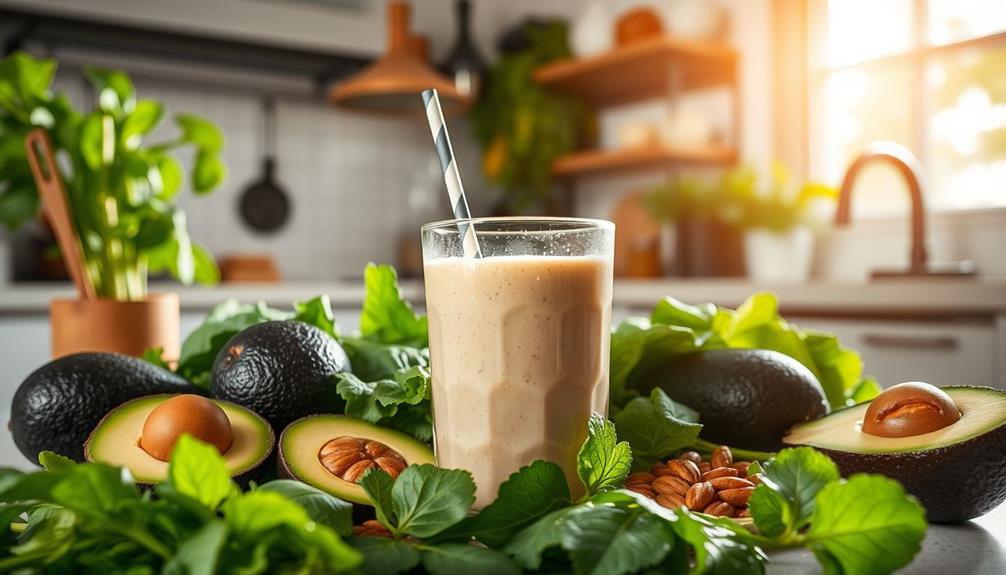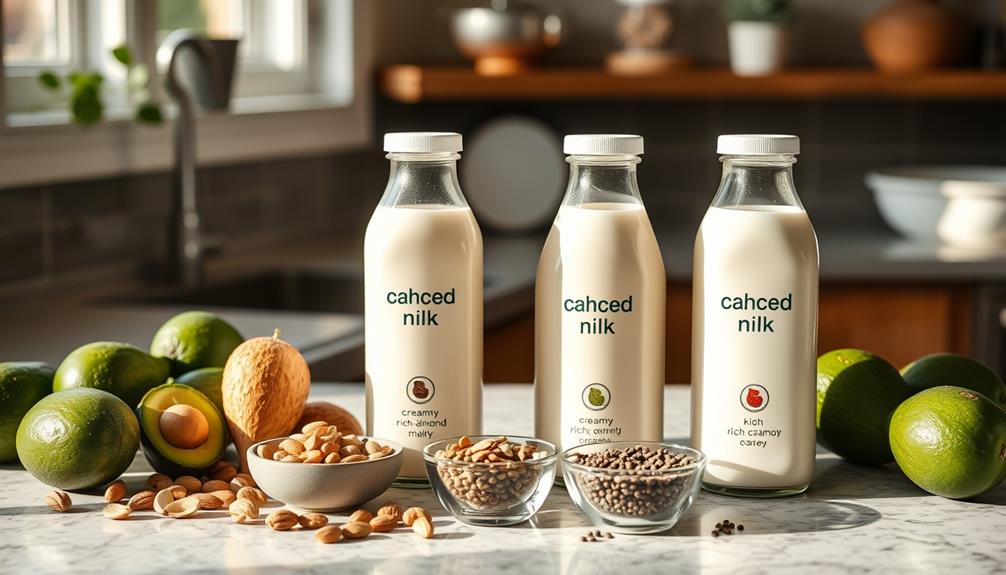Incorporating collagen into your keto lifestyle can be a game changer for achieving your health goals. Collagen helps maintain lean muscle mass, supports muscle recovery, and keeps you feeling full, making it easier to manage your appetite. It also enhances joint and gut health, which can be beneficial on a high-fat diet. You can find collagen in bone broth, fatty fish, or as supplements in powders and capsules. To get the most out of it, aim for 10 to 20 grams daily. Curious about the best sources and ways to use it? There's more to explore!
Key Takeaways
- Collagen supports muscle growth and recovery, enhancing overall fitness on a keto diet.
- It promotes feelings of fullness, aiding in appetite management during ketosis.
- Collagen improves joint health, alleviating pain and stiffness often experienced on high-fat diets.
- Supplementing collagen strengthens gut lining, optimizing digestion and nutrient absorption.
- Consistent collagen intake amplifies the health benefits already gained from following a keto lifestyle.
Understanding Collagen
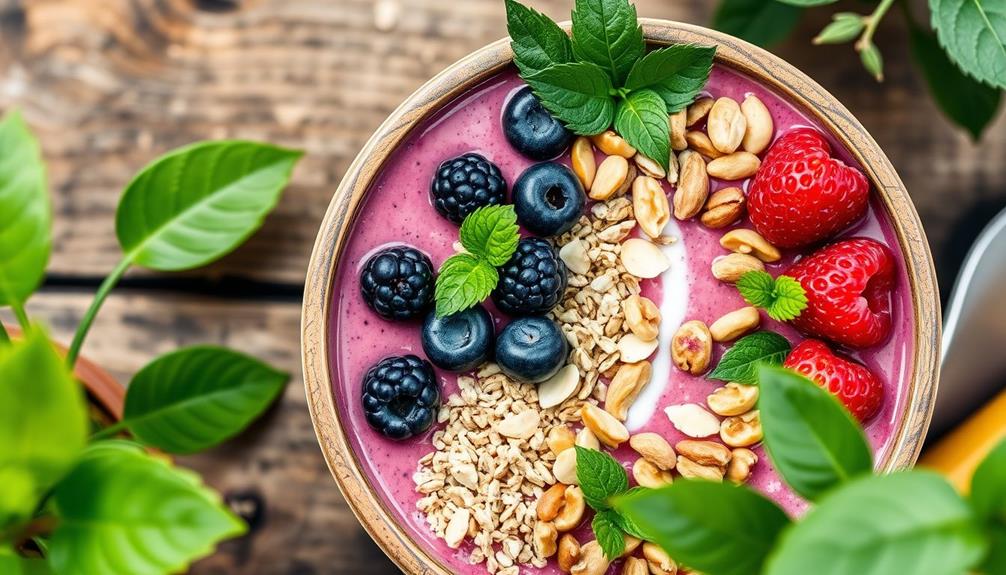
When you think about the most abundant protein in your body, collagen likely comes to mind. This essential protein plays an important role in maintaining the integrity of your tissues and organs. It provides structure, elasticity, and strength, which are critical for overall wellness.
Composed of amino acids, collagen supports various bodily functions, ensuring everything operates smoothly.
There are over 28 types of collagen, but the most prevalent are Type I, II, III, and IV. Type I supports your skin and bones, Type II is key for cartilage and joints, Type III enhances skin elasticity, and Type IV helps maintain basement membranes.
Understanding these types helps you choose the right supplements for your specific health needs.
Health Benefits of Collagen

Collagen offers a range of impressive health benefits that can greatly enhance your well-being. By incorporating collagen into your routine, you'll experience:
- Improved skin hydration and elasticity, reducing signs of aging
- Enhanced joint health, relieving pain and stiffness for better mobility
- Stronger gut lining, which aids in digestion and nutrient absorption
These benefits aren't just about looking good; they play a vital role in overall health.
Collagen helps you maintain lean muscle mass while supporting your weight loss efforts.
Plus, it can improve your recovery after workouts.
By prioritizing collagen, you're investing in a healthier, more vibrant you.
Don't underestimate its potential—make it a staple in your daily regimen for lasting wellness.
Collagen's Role in Keto
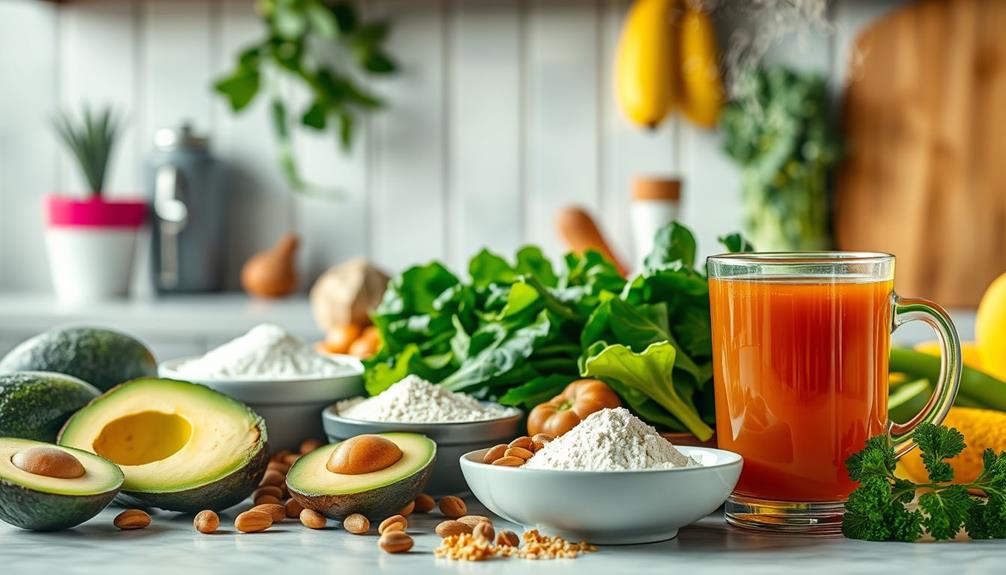
Incorporating collagen into your keto diet can amplify the health benefits you've already started to experience. Not only does collagen provide support for healthy hair, skin, and nails, but it also aids in gut health and joint function. Incorporating collagen into your keto diet can enhance these benefits and help you feel your best. The protein in keto success comes not only from the high-fat foods typically associated with the diet, but also from quality sources like collagen that can support overall health and wellness.
Collagen is a protein powerhouse that supports muscle growth and recovery while you're in ketosis. By providing essential amino acids, it helps you maintain lean muscle mass, which is vital for effective weight loss.
You'll also find that collagen promotes feelings of fullness, making it easier to manage your appetite and stick to your low-carb goals.
Additionally, it supports joint and gut health, addressing common issues that can arise on a high-fat diet.
Best Collagen Sources

Finding the best collagen sources is essential for maximizing the benefits of your keto diet. Incorporating high-quality collagen into your meals can improve skin health, support joints, and enhance overall well-being.
Here are some top sources you should consider:
- Bone Broth: Rich in collagen and nutrients, it's a warming, comforting option.
- Fatty Fish: Salmon and mackerel not only provide collagen but also healthy omega-3 fatty acids.
- Chicken Skin: This tasty source is packed with collagen and can be easily added to various dishes.
How to Supplement Collagen
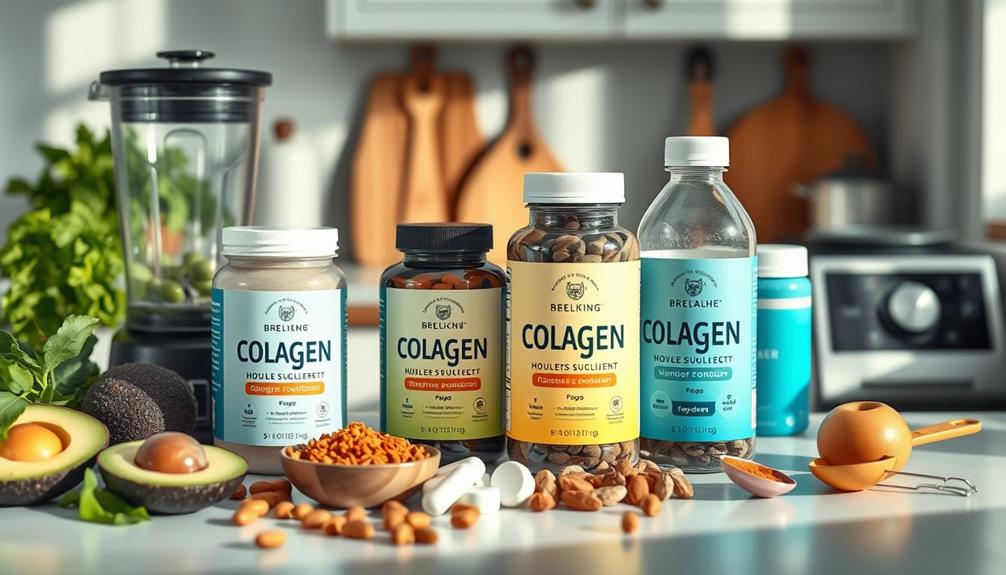
If you're looking to boost your collagen intake, supplementation can be a convenient way to reap its many benefits. You can choose from various forms, including powders, capsules, and liquid.
Collagen powders are especially versatile; just mix them into your coffee, smoothies, or yogurt for an easy daily dose. Most experts recommend taking 10 to 20 grams daily, but it's best to tailor your intake to your specific health goals and body weight.
Brands like Essential Proteins and Organika offer high-quality options to evaluate. Remember to check the ingredient labels for added sugars or fillers.
Consistency is key, so make it a habit to incorporate collagen into your routine for ideal results!
Potential Side Effects

While collagen supplements offer numerous benefits, it's important to be aware of potential side effects. Some people may experience mild reactions as their bodies adjust.
Here are a few things to take into account:
- Digestive discomfort, including bloating or gas.
- Allergic reactions, especially if you're sensitive to specific sources like fish or eggs.
- Interactions with medications, particularly for those with osteoporosis or Alzheimer's.
If you notice any adverse effects, it's best to consult with a healthcare provider.
Start with a lower dose to help your body adapt and monitor your response. Staying informed will guarantee you reap the benefits of collagen while minimizing any unwanted side effects.
Tips for Incorporation
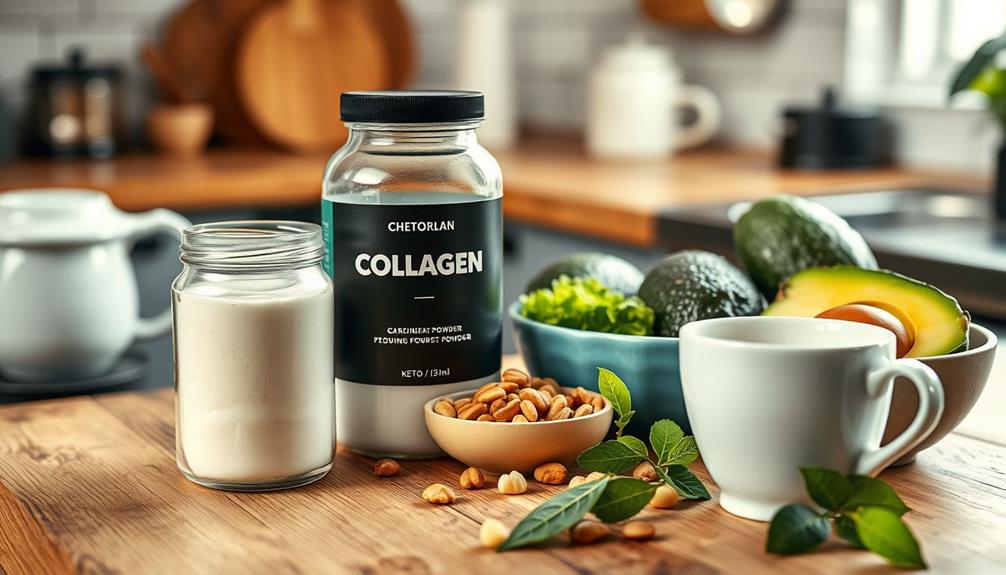
Incorporating collagen into your daily routine can enhance the benefits you experience from supplementation. Here are some easy ways to do it:
| Method | Description |
|---|---|
| Coffee Boost | Mix collagen powder into your morning coffee for a protein-packed start. |
| Smoothie Add-In | Blend it into your favorite keto smoothie for added nutrition. |
| Bone Broth | Use collagen-rich bone broth as a base for soups or stews. |
| Keto Gummies | Make homemade gummies using collagen for a tasty treat. |
Frequently Asked Questions
Can Collagen Supplements Replace Dietary Protein Sources?
Collagen supplements can't fully replace dietary protein sources. While they provide essential amino acids, you still need a variety of proteins for balanced nutrition. Aim for a mix of collagen and other protein-rich foods for ideal health.
Is Collagen Safe for Pregnant or Breastfeeding Women?
Think of collagen as a gentle embrace for your body. While it's generally safe, consult your healthcare provider during pregnancy or breastfeeding to ascertain it fits your unique health tapestry and nutritional needs.
How Long Does It Take to See Collagen Benefits?
You'll typically start noticing benefits from collagen supplements within four to six weeks. Consistency is key, so keep taking it daily to support skin health, joint function, and overall wellness for the best results.
Can Vegetarians or Vegans Consume Collagen?
You can't just conjure collagen from thin air! Unfortunately, vegetarians and vegans can't directly consume collagen, as it's animal-derived. But don't fret! Plant-based options can boost your body's natural collagen production.
Are Collagen Supplements Effective for Everyone?
Collagen supplements can be effective for many, but individual results vary. You should consider factors like diet, lifestyle, and specific health needs. It's best to consult a healthcare provider to determine if they're right for you.
Conclusion
Incorporating collagen into your keto routine can be a game-changer for your health and happiness. By boosting beauty, building bones, and supporting your skin, collagen complements your low-carb lifestyle beautifully. So, don't hesitate to plunge into delicious dishes or delightful supplements rich in collagen. With these strategies, you'll supercharge your success on your keto journey. Embrace the benefits, enhance your wellbeing, and enjoy the fabulous fusion of collagen and keto for a vibrant, healthier you!
